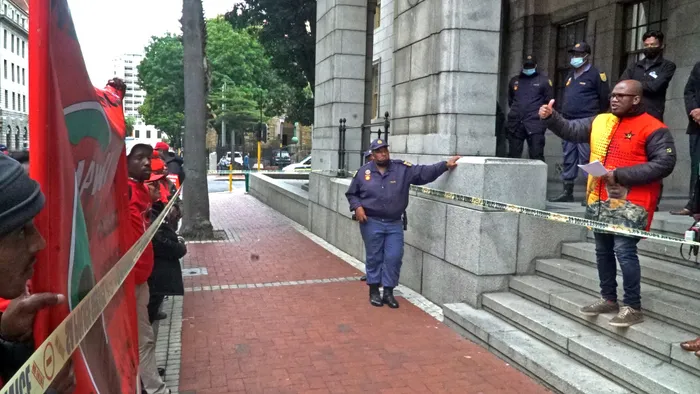GNU: Auction of the revolution to market forces, a move to the right

Benson Ngqentsu, Provincial Secretary of the SACP, Western Cape, speaks at a Nehawu picket outside the Western Cape Legislature. Ngqentsu says it is naïve to believe that the composition of the so-called GNU has any class neutrality. – Picture: Ian Landsberg
By Benson Ngqentsu
The present public discourse about the composition of the Government of National Unity (GNU) requires class analysis. In conducting class analysis, we need to ask pertinent questions.
What are the class interests of the forces constituting the GNU? What role did market forces play in the discussions? How do market forces influence the body politics of the African National Congress-headed (ANC-headed) alliance?
How will the GNU, in its current form, position South Africa in the international arena? Is it a coincidence that this GNU is constitutive of pro-Zionist forces such as DA, IFP and PA? How will the GNU impact our national sovereignty and policies?
It would be naïve to believe that the composition of the so-called GNU has any class neutrality. Given the proximity of leading figures within the ruling ANC to market forces, big capital certainly played a more influential role than the ANC’s alliance strategic partners, the SACP and Cosatu, in shaping its formation.
It is common knowledge that the ANC’s strategic allies, particularly the SACP, argued for a minority government with GNU features that exclude the DA and the MK Party. Conversely, market forces, represented by figures like Magda Wierzycka, CEO of asset manager Sygnia and Ninety-One CEO Hendrik du Toit, favoured a DA-ANC coalition.
Interestingly, the outcome favours the interests of the ruling class, the market forces. Thus, I argue that the current form of the GNU represents the realignment of class forces within and outside the ANC and the consolidation of their class agenda.
This was made evident in a recent conversation with Allen Winde, the Premier of the Western Cape, in Parliament’s chamber when he affirmed that given the current trajectory, neoliberalism will be enabled from the national level in response to me telling him that we are going to roll back neoliberalism in the Western Cape.
There is no doubt in my mind that the appointment of cabinet Ministers and their deputies by President Ramaphosa will further consolidate the interests of market forces.
Given that these market forces and their proxies from within the ANC will be emboldened, those who have been seen as stumbling blocks to their interests will be excluded and pushed to the periphery.
Ministries of interest to market forces include the entire economic cluster particularly, Trade and Industry, Agriculture, Mineral Resources and Energy and Fisheries.
Further, where will the current developments place the National Democratic Revolution and the strategic role and leadership of our historic revolutionary alliance?
Given the class interests of the DA as detailed in its manifesto, if there is no review of the present GNU, a rupture is imminent within the body politics of the ANC and the broader alliance.
In the final analysis, the GNU must not be used to auction off our national democratic revolution to international market forces. Therefore, progressive forces within the ANC and the organs of the alliance, in particular, must rise in defence of our movement, revolution and people, from market interests.
* Benson Ngqentsu is the Western Cape SACP Provincial Secretary
** The views expressed here are not necessarily those of The African.